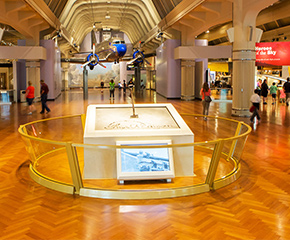
Heinz: 57 Varieties and then some!
9 artifacts in this set
This expert set is brought to you by:
The staff at The Henry Ford
Trade Card for Keystone Brand Pickles, Vinegars, Mustard, F. & J. Heinz, circa 1880
Trade card
In 1869, H.J. Heinz entered his first business partnership to form Heinz & Noble, which sold pickled foods and condiments until going out of business in 1875. In 1876, Heinz persuaded family members to begin a new company -- F. & J. Heinz -- with H.J. Heinz running the company behind the scenes until he could rebuild his reputation and take over the company.
Trade Card for Heinz & Noble, circa 1872
Trade card
In 1869, H.J. Heinz entered his first business partnership to form Heinz & Noble. It began by exclusively selling horseradish and within a few years expanded to include pickles and condiments such as celery sauce and "catsups." Heinz & Noble advertised its products in a variety of methods, including trade cards -- a medium that gained momentum in the late 19th century.
Trade Card for H.J. Heinz Company, "Mamma's Favorites," circa 1905
Trade card
As color printing gained momentum in the late 19th century, trade cards became a major means for advertising goods and services. Americans enjoyed and often saved these little advertisements found in product packages or distributed by local merchants. Trade cards for the H.J. Heinz Company, like the one seen here, promoted its pickled foods, preserves and condiments.
Streetcar Advertising Poster for Heinz Chow Chow Pickle, "A Flavor Really Distinctive," circa 1920
Poster
Henry J. Heinz rarely missed an opportunity to market his "57 Varieties" -- a catchy slogan he created despite offering a line of more than 60 packaged food products. A prolific promoter, Heinz aimed to reach consumers in stores, at home, and everywhere in-between. This colorful poster advertised Heinz Chow Chow Pickle, a kind of relish, to passengers riding a streetcar.
Streetcar Advertising Poster for Heinz Prepared Mustard, "A Mild, Smooth, Yellow Mustard" circa 1922
Poster
Henry J. Heinz rarely missed an opportunity to market his "57 Varieties" -- a catchy slogan he created despite offering a line of more than 60 packaged food products. A prolific promoter, Heinz aimed to reach consumers in stores, at home, and everywhere in-between. This colorful poster advertised Heinz Prepared Mustard to passengers riding a streetcar.
Advertising Poster, Heinz Strained Carrots, circa 1940
Poster
This poster advertised Heinz Strained Carrots without promotional text. After decades of effective publicity, the H.J. Heinz Company had become a well-known brand with recognizable packaging. Colorful imagery alone could communicate an important marketing message: Heinz products were prepared with fresh, high-quality ingredients.
Illustration for Heinz Product Advertising, circa 1920
Watercolor (Painting)
Henry J. Heinz began selling prepared horseradish to nearby grocery stores in 1869, and quickly expanded his product line to include a variety of foods and condiments. Heinz soon established his brand nationwide through superior, consistent products and distinctive packaging. The keystone label, green "Heinz" pickle, and "57 Varieties" slogan endured as H.J. Heinz Company hallmarks.
Streetcar Advertising Poster for Heinz Baked Beans, "He Shows He Knows," circa 1930
Poster
Henry J. Heinz rarely missed an opportunity to market his "57 Varieties" -- a catchy slogan he created despite offering a line of more than 60 packaged food products. A prolific promoter, Heinz aimed to reach consumers in stores, at home, and everywhere in-between. This colorful poster advertised one type of Heinz Baked Beans to passengers riding a streetcar.
Streetcar Advertising Poster for Heinz Breakfast Wheat, "A New Treat in Wheat," 1933-1935
Poster
Henry J. Heinz rarely missed an opportunity to market his "57 Varieties" -- a catchy slogan he created despite offering a line of more than 60 packaged food products. A prolific promoter, Heinz aimed to reach consumers in stores, at home, and everywhere in-between. This colorful poster advertised Heinz Breakfast Wheat, a hot cereal, to passengers riding a streetcar.


